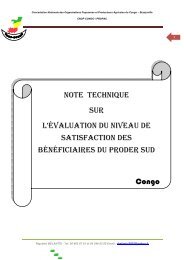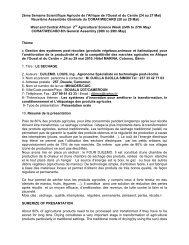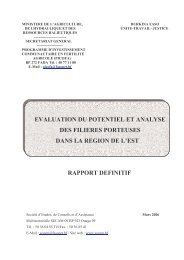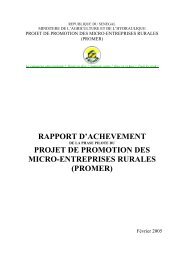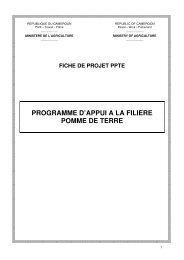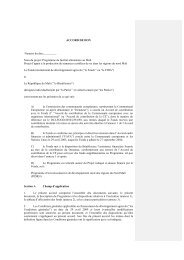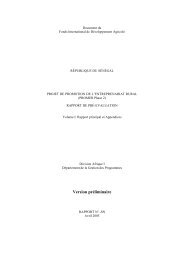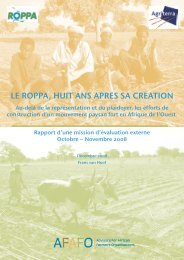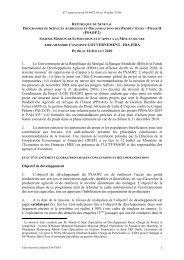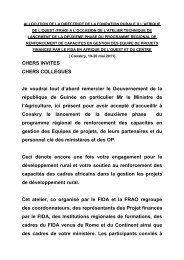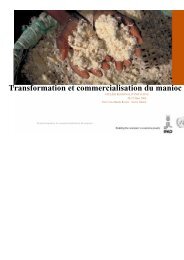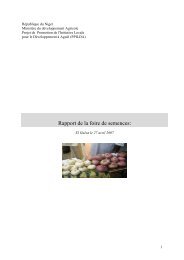Scaling Up the Fight Against Rural Poverty - FIDAfrique
Scaling Up the Fight Against Rural Poverty - FIDAfrique
Scaling Up the Fight Against Rural Poverty - FIDAfrique
Create successful ePaper yourself
Turn your PDF publications into a flip-book with our unique Google optimized e-Paper software.
• policies, as in assuring appropriate legal and regulatory frameworks for land ownership and<br />
use, for natural resource management, financial intermediation, etc.<br />
During <strong>the</strong> learning phase <strong>the</strong> experience with <strong>the</strong> design and implementation of <strong>the</strong> pilot is monitored<br />
and evaluated and a knowledge management process ensures that <strong>the</strong> lessons learned enter into <strong>the</strong><br />
IFAD-internal knowledge base and through dissemination contribute to <strong>the</strong> external knowledge base.<br />
In <strong>the</strong> scaling up phase <strong>the</strong> original idea, model or approach is brought to scale drawing on <strong>the</strong> internal<br />
knowledge base generated by <strong>the</strong> pilot and on external knowledge where appropriate.<br />
New<br />
idea,<br />
model,<br />
approach<br />
jlinn@brookings.edu<br />
Figure 1: Innovation, learning and scaling up<br />
linkages<br />
Pilot,<br />
Project<br />
Limited<br />
Impact<br />
M&E,<br />
Learning<br />
& KM<br />
2<br />
10<br />
Internal<br />
knowledge<br />
Outside<br />
knowledge<br />
Scale up<br />
Multiple<br />
Impact<br />
A number of observations can be made with regard to this innovation-learning-scaling up triad.<br />
1. Innovation, learning and scaling up should be treated as separate, albeit linked processes.<br />
Each of <strong>the</strong> three concepts refers to an important separate stage in <strong>the</strong> development of an intervention<br />
at scale, and each requires its own appropriate process, skills, resources and attention. Innovation and<br />
scaling up are often complementary, but <strong>the</strong>re are also times when <strong>the</strong>y compete in terms of resources,<br />
managerial attention, political pay-off, etc.<br />
2. Development actors (including IFAD) need to focus not only on innovation, but also on learning<br />
and scaling up.<br />
Over <strong>the</strong> last decade innovation was elevated as <strong>the</strong> main objective of IFAD’s interventions. While<br />
o<strong>the</strong>r development institutions have generally been less explicit about this, in fact this principal focus<br />
on innovation is endemic in <strong>the</strong> aid industry and <strong>the</strong> development business, usually to <strong>the</strong> detriment of<br />
an adequate focus on learning and especially on scaling up.<br />
3. The innovation-learning-scaling up process is not linear, but an iterative and interactive cycle.<br />
As indicated in Figure 1, <strong>the</strong>re are many feedback loops between from learning and scaling up back to<br />
innovation. Indeed, monitoring and evaluation often generates new ideas for better design and<br />
implementation and <strong>the</strong> scaling up process will often require adaptation and innovation in <strong>the</strong> way <strong>the</strong><br />
original model or idea is brought to scale. None<strong>the</strong>less, it is useful to think in terms of <strong>the</strong> three main<br />
1/18/10



